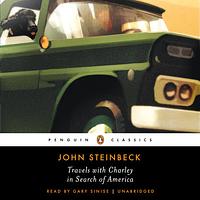Take a photo of a barcode or cover
Spoiler
I had very high expectations based on the Tom Hanks Ezra Klein podcast episode, Auntie Ri’s rave review, and me loving Steinbeck. It was certainly good, but fell short for me of those very lofty expectations. I wanted more biting, incisive commentary and less general observations.I loved the bits with Charley: the imagined dialogue and his spot on judge of character. The best line in the book was something like “Dogs show a moment of contempt in their reactions, and I’m basically convinced they think people are nuts.”
Some memorable scenes: New England miserable waitress and the Florida trap; beautiful, abundant Wisconsin and the guy that went from kicking him off the property to asking him to stay longer; the effeminate son (Minnesota?) wanting to be a hairdresser and Steinbeck convincing the father of its merits; the paison bar back in Monterey surrounded by change; and the strong finish on the ugliness of segregationists and race politics in the South. The conversation with the old Cajun “Ci Git” was almost definitely made up, but was great nonetheless.
adventurous
hopeful
informative
inspiring
reflective
slow-paced
I never knew he was such a funny writer. Dog lovers would find this book entertaining for the subtle humor but big character Charley brings to the story. Part 4 of this book was the best giving glimpse into the ugly human nature of large turning points for the country. I found it relevant for today's politics.
As the amazing author John Steinbeck sees himself getting along in years, he realizes that it has been decades since he truly spent any time getting to know the people in the nation he writes about. His desire to reconnect with America and see it again with his own eyes leads to something I personally love: a massive road trip. He gets a truck that he turns into a camper and he names it after Don Quiote's horse, Rocinante. And then he leaves his New York home and embarks on a cross-continental journey.
I chose this book because I was personally embarking on an 18 journey from Maryland to Las Vegas and back, I wanted something to inspire me and get me excited. This did that - to an extent. It's obviously a very different journey than the one I took, he took his in 1960 and instead of traveling with five children like I did, John's companion was his standard poodle, Charley. Charley is a main character in this story - he is John's confidant and his muse. And other than Charley, almost everyone else we meet in this story is a stranger, a snippet of a life that John is able to glean from a few minutes or hours of conversation over a bottle of whiskey.
I really, really liked it. I liked it because he painted a portait of 1960 for me - the ferocious pace of progress, the rise of the city and the freeway and the rest stop. I loved, particularly, his thoughts on traveling and how it changes us. There are parts that are hard to read, especially when he gets to the South and encounters all the tensions and hatred that were constantly boiling over. But in true Steinbeck fashion, he is a MASTER of our language. His prose is so fluid, his images so perceptive that I love his writing for its own sake. I have been told to be wary of considering this a literal travelogue - that it is far more "novel" than "true." But I think I am choosing not to let that bother me - I found truth in his words and ideas, not from whether or not he really stopped at a particular truck stop or not.
I want to mention that I listened to the audiobook version of this book, narrated by Gary Sinise, and he was INCREDIBLE. His accents were wonderful, his tone was so smooth and dreamy to listen to. I loved having him in my headphones.
I chose this book because I was personally embarking on an 18 journey from Maryland to Las Vegas and back, I wanted something to inspire me and get me excited. This did that - to an extent. It's obviously a very different journey than the one I took, he took his in 1960 and instead of traveling with five children like I did, John's companion was his standard poodle, Charley. Charley is a main character in this story - he is John's confidant and his muse. And other than Charley, almost everyone else we meet in this story is a stranger, a snippet of a life that John is able to glean from a few minutes or hours of conversation over a bottle of whiskey.
I really, really liked it. I liked it because he painted a portait of 1960 for me - the ferocious pace of progress, the rise of the city and the freeway and the rest stop. I loved, particularly, his thoughts on traveling and how it changes us. There are parts that are hard to read, especially when he gets to the South and encounters all the tensions and hatred that were constantly boiling over. But in true Steinbeck fashion, he is a MASTER of our language. His prose is so fluid, his images so perceptive that I love his writing for its own sake. I have been told to be wary of considering this a literal travelogue - that it is far more "novel" than "true." But I think I am choosing not to let that bother me - I found truth in his words and ideas, not from whether or not he really stopped at a particular truck stop or not.
I want to mention that I listened to the audiobook version of this book, narrated by Gary Sinise, and he was INCREDIBLE. His accents were wonderful, his tone was so smooth and dreamy to listen to. I loved having him in my headphones.
This is as much about the author as it was about his journey, but it's absolutely wonderful. Forget about Grapes of Wrath, this is lively and a good read. It's also a good snapshot of that time period, a slice of history.
fast-paced
adventurous
funny
reflective
medium-paced
adventurous
funny
reflective
medium-paced
For me, this book -- an introspective chronicle of Steinbeck's meandering, cross-country "Search for America" -- was an excellent and timely read. Though it is in some ways a historical snapshot of its time (copyright 1961, including dated language and attitudes), I would not say that it is *only* a historical snapshot. I believe that many of Steinbeck's discoveries, insights, experiences, and theories of what is distinctly American remain alive today.
As someone from the Deep South (or perhaps only as someone always hungry for a deeper sense of where I am from), I wish that Steinbeck had both spent more time here and spent more lines writing about his time here. As an outsider, and as a writer, his perspective is simultaneously limited and illuminating. It is necessary. I keep thinking about his brief passages on his time in Louisiana, Mississippi, and Alabama. Even half a century later, and even though he wrote from within the heat of a decade on fire, many of his words feel prophetic and pertaining.
"The South is in the pain of labor with the nature of its future child still unknown. And I have thought that such is the bitterness of the labor that the child has been forgotten."
This long labor continues. I initially lingered over the first sentence; with time, I think more on the second. The South as I have experienced it is fixated on the past, and much violent energy is expended contesting the relationship between it and the present. Caught up in the fraught means of these disputes, I've sometimes lost sight of the ends of them -- the futures we might make, leave behind, inherit. I think others might do so, too. The urgency of the present can obscure the future like an eclipse; can make us forget it in its illusory absence while we are caught in unsettling spectacle. I read Steinbeck's brief passages from the very unimagined future that he references in his writing; it reminds me to focus on the futures connected to the choices that I, we, make today, even if they are unseen and not always clear when we try to envision them.
In this era of alienation and [white] rural vs. urban divides, I was also really struck by the following passage:
"You know when people come into what they call the sticks, they have a contempt for the yokels. It took me a little time, but when I learned that there aren't any yokels I began to get on fine... Once you respect them, they can understand anything you can tell them."
I'm not sure to what extent I believe this is true -- that anything can be explained, understood, and maybe even accepted if only you bear enough courtesy and respect to the people you're talking to. My experience tells me that it is not true; my idealism tells me it must be, or at least that I must live as if it ought to be. In either case, I reject and resent the dismissal of "yokels," and I will continue to think critically about Steinbeck's optimism that substantial difference can be navigated by patience and respect alone. I am not sure that is a hope I can afford; I am not sure if I can afford not to have such a hope.
At the end of everything, this was a book that left me better for grasping after straws. It does not satisfy Steinbeck's questions or mine. It leaves questions. Creates them. It preserves a time now passing from memory. It seeks truths that live outside of memory. It is about loss and uncertain creation, and it meets me where I am today.
As someone from the Deep South (or perhaps only as someone always hungry for a deeper sense of where I am from), I wish that Steinbeck had both spent more time here and spent more lines writing about his time here. As an outsider, and as a writer, his perspective is simultaneously limited and illuminating. It is necessary. I keep thinking about his brief passages on his time in Louisiana, Mississippi, and Alabama. Even half a century later, and even though he wrote from within the heat of a decade on fire, many of his words feel prophetic and pertaining.
"The South is in the pain of labor with the nature of its future child still unknown. And I have thought that such is the bitterness of the labor that the child has been forgotten."
This long labor continues. I initially lingered over the first sentence; with time, I think more on the second. The South as I have experienced it is fixated on the past, and much violent energy is expended contesting the relationship between it and the present. Caught up in the fraught means of these disputes, I've sometimes lost sight of the ends of them -- the futures we might make, leave behind, inherit. I think others might do so, too. The urgency of the present can obscure the future like an eclipse; can make us forget it in its illusory absence while we are caught in unsettling spectacle. I read Steinbeck's brief passages from the very unimagined future that he references in his writing; it reminds me to focus on the futures connected to the choices that I, we, make today, even if they are unseen and not always clear when we try to envision them.
In this era of alienation and [white] rural vs. urban divides, I was also really struck by the following passage:
"You know when people come into what they call the sticks, they have a contempt for the yokels. It took me a little time, but when I learned that there aren't any yokels I began to get on fine... Once you respect them, they can understand anything you can tell them."
I'm not sure to what extent I believe this is true -- that anything can be explained, understood, and maybe even accepted if only you bear enough courtesy and respect to the people you're talking to. My experience tells me that it is not true; my idealism tells me it must be, or at least that I must live as if it ought to be. In either case, I reject and resent the dismissal of "yokels," and I will continue to think critically about Steinbeck's optimism that substantial difference can be navigated by patience and respect alone. I am not sure that is a hope I can afford; I am not sure if I can afford not to have such a hope.
At the end of everything, this was a book that left me better for grasping after straws. It does not satisfy Steinbeck's questions or mine. It leaves questions. Creates them. It preserves a time now passing from memory. It seeks truths that live outside of memory. It is about loss and uncertain creation, and it meets me where I am today.
John Steinbeck would have been my friend. Because he is totally cool, and you can tell by reading this book. Put away Of Mice and Men, Cannery Row, and East of Eden and any forced-to-read feelings you have left over from high school or college.
Travels with Charley is a cross-country road trip memoir and it rocks.
Travels with Charley is a cross-country road trip memoir and it rocks.




